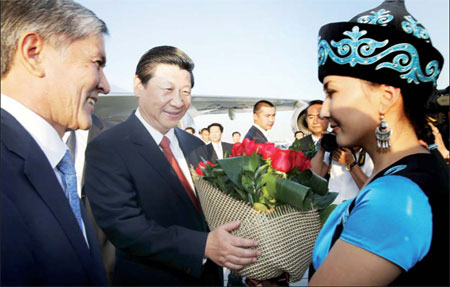Silk Road to take on a new look
Updated: 2013-09-13 10:02
By Li Xiaokun in Beijing and Zhang Yuwei in New York (China Daily)
|
|||||||||||
Experts call to set up free trade zone to cover China and Eurasian countries
President Xi Jinping's proposal to build a "Silk Road Economic Belt" is a huge economic opportunity for the region, observers said.
To realize the goal, which Xi set out in his first formal policy speech on Central Asia, they suggested a free trade zone that includes China and Eurasian countries, which have a combined population of 3 billion.
In a speech at Kazakhstan's Nazarbayev University on Saturday, Xi proposed establishing a Silk Road Economic Belt, similar to the original, ancient Silk Road of more than 2,000 years ago, to boost cooperation between China and Eurasian countries.
The regional cooperation structure, Xi said, can be set up through "strengthening policy communications, road connections, trade facilitation, currency circulation and people-to-people exchanges".
"My home, Shaanxi province, is the start of the ancient Silk Road," Xi said.
He said he was moved as he reviewed the Silk Road's history during his visit to Kazakhstan, a modern nation on the ancient commercial road.
The Silk Road boasts a population of 3 billion and a market that is unparalleled both in scale and potential, Xi said.
He also said that Beijing considers relations with Central Asian countries a foreign-policy priority.
Ann Lee, author of What the US Can Learn from China and an adjunct professor of economics and finance at New York University, said she believes "Xi is correct as seeing the Silk Road as a huge economic opportunity".
"Now that border issues with Russia are more or less resolved in Central Asia, there are very few barriers left to overcome for serious development and investment."
Jon Taylor, a professor of political science at the University of St. Thomas in Houston, Texas, said that given China's strategy of developing its western regions, it is logical to extend the policy into Central Asia by strengthening relations with China's western neighbors for economic and security reasons.
"Proposing a new Silk Road is a strategic necessity for China. As a great power, China has to protect its vital economic interests and political influence in the region. The new Silk Road proposal does that.
"As President Xi has said, it's a 'win-win' proposal. Why not encourage a free trade zone that encompasses 3 billion people, has tremendous mineral and energy resources, and access to both Europe and the Middle East?"
Nazari Pariani, editor-in-chief of Mandegar Daily, a leading Afghan newspaper, told Xinhua News Agency that China's new policy to build the economic belt would benefit the whole region.
"Since Afghanistan is in Central Asia and is a neighbor of China, it can enormously benefit from China's new Central Asia policy," Pariani said.
"Since the Silk Road passes through Afghanistan, the revival of its historic position can help Afghanistan act as a bridge between Central, East and South Asia."
He added that his country can play a significant role in enhancing trade and economic cooperation in the region.
Contact the writers at lixiaokun@chinadaily.com.cn and yuweizhang@chinadailyusa.com
|
President Xi Jinping is welcomed by his Kyrgyz counterpart Almazbek Atambaev (left) as he arrives at the airport in Bishkek, Kyrgyzstan, on Sept 10. Xinhua |
(China Daily European Weekly 09/13/2013 page2)
Today's Top News
List of approved GM food clarified
ID checks for express deliveries in Guangdong
Govt to expand elderly care
University asks freshmen to sign suicide disclaimer
Tibet gears up for new climbing season
Media asked to promote Sino-Indian ties
Shots fired at Washington Navy Yard
Minimum growth rate set at 7%
Hot Topics
Lunar probe , China growth forecasts, Emission rules get tougher, China seen through 'colored lens', International board,
Editor's Picks

|

|

|

|

|

|






